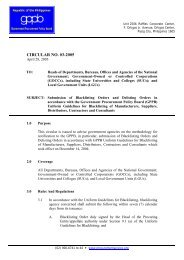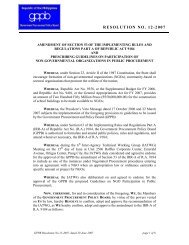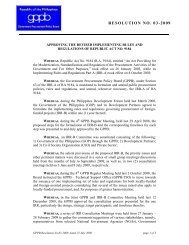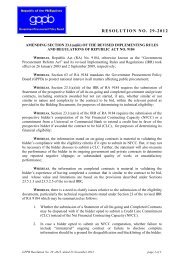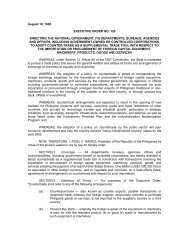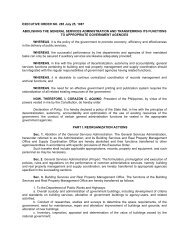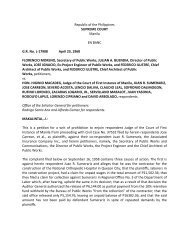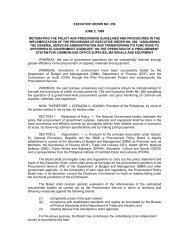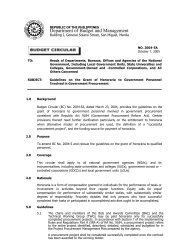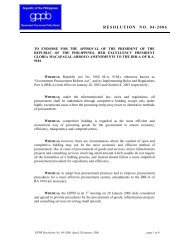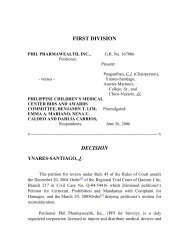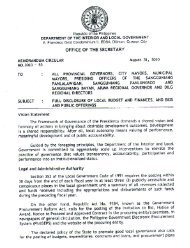G.R. No. 124293 - GPPB
G.R. No. 124293 - GPPB
G.R. No. 124293 - GPPB
You also want an ePaper? Increase the reach of your titles
YUMPU automatically turns print PDFs into web optimized ePapers that Google loves.
exercise of this discretion is a policy decision that necessitates prior inquiry, investigation,comparison, evaluation, and deliberation. This task can best be discharged by the Governmentagencies concerned, not by the Courts. The role of the Courts is to ascertain whether a branchor instrumentality of the Government has transgressed its constitutional boundaries. But theCourts will not interfere with executive or legislative discretion exercised within thoseboundaries. Otherwise, it strays into the realm of policy decision-making.It is only upon a clear showing of grave abuse of discretion that the Courts will set aside theaward of a contract made by a government entity. Grave abuse of discretion implies acapricious, arbitrary and whimsical exercise of power (Filinvest Credit Corp. v. IntermediateAppellate Court, <strong>No</strong>. 65935, 30 September 1988, 166 SCRA 155). The abuse of discretion mustbe so patent and gross as to amount to an evasion of positive duty or to a virtual refusal toperform a duty enjoined by law, as to act at all in contemplation of law, where the power isexercised in an arbitrary and despotic manner by reason of passion or hostility (Litton Mills, Inc.v. Galleon Trader, Inc., et al[.], L-40867, 26 July 1988, 163 SCRA 489).The facts in this case do not indicate any such grave abuse of discretion on the part of publicrespondents when they awarded the CISS contract to Respondent SGS. In the "Invitation toPrequalify and Bid" (Annex "C," supra), the CISS Committee made an express reservation of theright of the Government to "reject any or all bids or any part thereof or waive any defectscontained thereon and accept an offer most advantageous to the Government." It is a wellsettledrule that where such reservation is made in an Invitation to Bid, the highest or lowestbidder, as the case may be, is not entitled to an award as a matter of right (C & C CommercialCorp. v. Menor, L-28360, 27 January 1983, 120 SCRA 112). Even the lowest Bid or any Bid maybe rejected or, in the exercise of sound discretion, the award may be made to another than thelowest bidder (A.C. Esguerra & Sons v. Aytona, supra, citing 43 Am. Jur., 788). (emphasessupplied)1awphi1.nétLike the condition in the Bureau Veritas case, the right to top was a condition imposed by thegovernment in the bidding rules which was made known to all parties. It was a conditionimposed on all bidders equally, based on the APT’s exercise of its discretion in deciding onhow best to privatize the government’s shares in PHILSECO. It was not a whimsical or arbitrarycondition plucked from the ether and inserted in the bidding rules but a condition which theAPT approved as the best way the government could comply with its contractual obligations toKAWASAKI under the JVA and its mandate of getting the most advantageous deal for thegovernment. The right to top had its history in the mutual right of first refusal in the JVA andwas reached by agreement of the government and KAWASAKI.Further, there is no "executive interference" in the functions of this Court by the mere filing of amemorandum by Secretary of Finance Jose Isidro Camacho. The memorandum was merely"noted" to acknowledge its filing. It had no further legal significance. <strong>No</strong>tably too, the assailedResolution dated September 24, 2003 was decided unanimously by the Special First Divisionin favor of the respondents.



